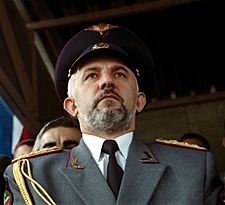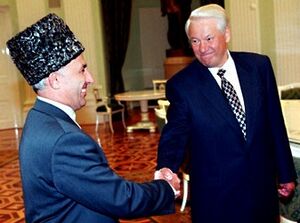Aslan Maskhadov facts for kids
Quick facts for kids
Aslan Maskhadov
|
|
|---|---|
|
Масхадан Аслан
|
|
 |
|
| 3rd President of the Chechen Republic of Ichkeria | |
| In office 12 February 1997 – 8 March 2005 |
|
| Vice President | Vakha Arsanov Abdul-Halim Sadulayev |
| Preceded by | Zelimkhan Yandarbiyev (acting) |
| Succeeded by | Abdul-Halim Sadulayev (acting) |
| Prime Minister of Ichkeria | |
| In office 16 October 1996 – 1 January 1997 |
|
| Preceded by | Zelimkhan Yandarbiyev |
| Succeeded by | Ruslan Gelayev |
| In office February 1997 – 1 January 1998 |
|
| Preceded by | Ruslan Gelayev |
| Succeeded by | Shamil Basayev |
| In office 3 July 1998 – February 2000 |
|
| Preceded by | Shamil Basayev |
| Succeeded by | Office abolished |
| Personal details | |
| Born |
Aslan Aliyevich Maskhadov
21 September 1951 Karaganda, Kazakh SSR, Soviet Union |
| Died | 8 March 2005 (aged 53) Tolstoy-Yurt, Chechnya, Russia |
| Political party | Party of National Independence |
| Spouse | Kusama Maskhadova |
| Children | 3 |
| Profession | Officer (armed forces) |
| Signature |  |
| Military service | |
| Allegiance | |
| Battles/wars | First Chechen War Second Chechen War |
Aslan (Khalid) Aliyevich Maskhadov (born September 21, 1951 – died March 8, 2005) was an important Chechen political and military leader. He served as the third president of the Chechen Republic of Ichkeria, which was a government that was not officially recognized by other countries.
Many people believed he was key to the Chechen victory in the First Chechen War. This war led to Chechnya becoming independent for a time. Maskhadov was elected President of Chechnya in January 1997. When the Second Chechen War began in August 1999, he led the resistance against the Russian army. He was killed in March 2005 in a village in northern Chechnya.
Contents
Biography
Early Life and Military Career
Aslan Maskhadov was born on September 21, 1951, in a small village called Shakai. This was in the Kazakh Soviet Socialist Republic (SSR), part of the Soviet Union. His family, like many other Chechens, had been forced to move there in 1944. In 1957, his family returned to their homeland in Chechnya.
Maskhadov joined the Soviet Army and trained in Georgia. He graduated from the Tbilisi Artillery School in 1972. Later, he graduated with honors from the Leningrad Kalinin Higher Artillery school in 1981. He served in Hungary and then in the Baltic region. By 1990, he was the chief of staff for Soviet missile and artillery forces in Vilnius, Lithuania. He retired from the Soviet Army in 1992 as a colonel and went back to Chechnya.
After the Soviet Union broke apart, Maskhadov became involved in Chechen politics. In 1993, he became the acting chief of staff for the Chechen armed forces. By March 1994, he was officially the chief of staff.
Role in the First Chechen War
The First Chechen War started in December 1994. Aslan Maskhadov was the top military leader for the Chechen side during this war. Many saw him as crucial to the Chechen victory against Russian forces.
As the First Deputy Chairman of the Chechen State Defence Council, Maskhadov organized the defense of the capital city, Grozny. He commanded the city's defense from the Presidential Palace.
Maskhadov also took part in peace talks to end the conflict. In June 1996, he signed a ceasefire agreement in Nazran, Ingushetia. On August 31, 1996, he signed the Khasav-Yurt Accord. This was a peace treaty that officially ended the First Chechen War.
President of Chechnya
In October 1996, Maskhadov became the Prime Minister of Chechnya. He also remained the chief of staff and defense minister. On December 3, 1996, he decided to run for President of Ichkeria. The elections were held in January 1997 and were considered free and fair. Observers from over 20 countries and organizations like the United Nations watched the elections.
Maskhadov won with 60% of the votes. He was congratulated by the Russian President, Boris Yeltsin. Maskhadov became president on February 12, 1997. He also took on the role of prime minister and commander-in-chief of the armed forces. On May 12, 1997, he signed a peace treaty with President Yeltsin in Moscow.
During his time as president, Maskhadov faced many challenges. Almost half a million people had lost their homes and were living in refugee camps. The economy was in ruins. Maskhadov tried to bring order and control to the country. He also faced challenges from different groups within Chechnya. In February 1999, he introduced Islamic Sharia law as a way to unite different groups.
Maskhadov survived several attempts on his life in 1998 and 1999.
The Second Chechen War
In the summer of 1999, some Chechen commanders tried to spread the conflict to the neighboring region of Dagestan. Maskhadov spoke out against this action. However, this event, along with some bombings in Russia, led to the start of the Second Chechen War. On October 1, 1999, the Russian Prime Minister, Vladimir Putin, declared Maskhadov's government illegal. Russian forces then entered Chechnya.
Maskhadov tried to offer a peace plan on October 11, 1999, but Russia rejected it. In response, President Maskhadov declared a "holy war" to fight the approaching Russian army. He also declared martial law and called up reservists.
Maskhadov was one of the main commanders during the Battle of Grozny (1999–2000). He and his fighters launched counter-attacks and used the city's sewer systems to their advantage. After a meeting with other rebel commanders, Maskhadov decided to withdraw from Grozny. They left many traps and landmines to slow down the Russian forces.
After leaving Grozny, Maskhadov became a hidden guerrilla leader. He was one of Russia's most wanted men. He repeatedly offered to hold peace talks with Moscow, but his requests were always turned down.
Maskhadov believed in armed resistance against what he saw as Russia's occupation of Chechnya. However, he condemned attacks on civilians. He often denied responsibility for brutal acts against Russian civilians carried out by other groups. He stated that such actions were wrong. For example, he described the attackers behind the Beslan school siege as "madmen" and called the attack an atrocity. However, he did accept responsibility for the 2004 Nazran raid, which targeted police and troops.
In January 2005, Maskhadov ordered all military operations to stop, except for self-defense, until the end of February. This was a gesture of goodwill, and he again called for a peaceful end to the conflict. His negotiator said that the Chechens were no longer seeking full independence, but only "guarantees for the existence of the Chechen nation." This ceasefire was supported by some, but Russia rejected any negotiations.
Death
Aslan Maskhadov was killed on March 8, 2005, in the village of Tolstoy-Yurt. Russian special forces had located him. There are different stories about how he died. Some say the special forces wanted to capture him alive but accidentally killed him with a grenade.
After his death, the Chechen rebel council announced that Abdul-Halim Sadulayev would take over as leader. Maskhadov's family has asked for his remains to be returned for burial, but Russian authorities have refused.
Family Life
Aslan Maskhadov married at the age of 17. His wife, Kusama, was a teacher. They had two children: a son named Anzor and a daughter named Fatima. His son, Anzor, took part in military actions during the First Chechen War.
Images for kids
See also
 In Spanish: Aslán Masjádov para niños
In Spanish: Aslán Masjádov para niños
 | Emma Amos |
 | Edward Mitchell Bannister |
 | Larry D. Alexander |
 | Ernie Barnes |



